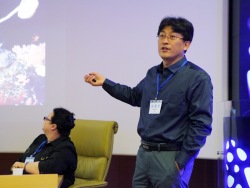Marine Biodiversity for a Healthy Ocean

On October 11, the Primorsky Aquarium served as a venue for the 5th Russian-Chinese bilateral workshop on marine biology, themed “Marine Biodiversity for a Healthy Ocean – Biodiversity, Functional Groups and Ocean Health”. The international event was organized under an agreement for scientific and educational cooperation between the A. V. Zhirmunsky National Scientific Center of Marine Biology, Far Eastern Branch, Russian Academy of Sciences (NSCMB FEB RAS) and the Institute of Oceanology, Chinese Academy of Sciences (IOCAS). Among the Chinese participants in the workshop there also were specialists of the Yantai Institute for Coastal Zone Research, Chinese Academy of Sciences.
Both countries’ scientists presented results of their research on marine biodiversity conducted mainly in the north-western Pacific and discussed the related issues of marine biology and ecology as well as tools for sustainable natural resources exploitation.
The workshop is the 5th scientific meeting jointly arranged by the NSCMB FEB RAS and the IOCAS. The first event in the series was held in Quingdao in 2007. The participants consider the workshop to be not only an open platform for discussing various aspects of biodiversity and for reporting internationally on their country’s scientific achievements but also an event that helps to strengthen relations among the Asia-Pacific countries and to work out a common action plan for protecting ocean health.
Besides talking about concerns of marine biodiversity conservation, representatives of the NSCMB FEB RAS and the IOCAS signed a new cooperation agreement that includes plans for a joint cruise of Russian and Chinese deep-sea researchers. The scientific institutions also concluded a preliminary agreement to establish an international center for the study of marine biota and environment. These compacts are of particular importance since the Institute of Oceanology, Chinese Academy of Sciences, will become a core part of the Chinese National Center of Marine Science and Education in 2020.
Click here to see the workshop proceedings in English.